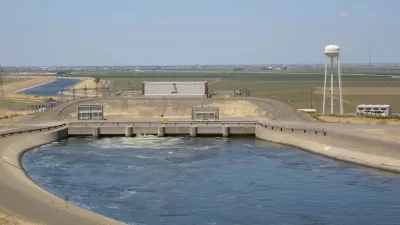On the heels of losing an oil reduction mandate due to lobbying by Big Oil, another key climate bill failed to pass—setting greenhouse gas reduction targets beyond 2020. An oil pipeline safety bill resulting from Santa Barbara spill passed.
As posted here in March, SB 32, which goes by the same name as the landmark AB 32, "The California Global Warming Solutions Act of 2006," would have required greenhouse gases to be cut to 80 percent below the 1990 levels by 2050.
The bill by Sen. Fran Pavley, D-Agoura Hills, who also was an author of AB 32 in 2006, "failed to win enough support from lawmakers and faced objections from the governor's office," write Patrick McGreevy and Melanie Mason for the Los Angeles Times. She "vowed to revive it next year."
The regular 2015 legislative season ended on Friday, September 11, although an interim session continues where they will take up transportation funding. "The defeat came a day after Gov. Jerry Brown and legislative leaders withdrew a key portion of another proposal to combat climate change [SB 350], one calling for California to cut its use of gasoline in half," write McGreevy and Mason.
Pavley tried to overcome opposition to her measure by changing it to provide more legislative oversight of the state's powerful Air Resources Board, which has become a sticking point in climate-related negotiations with lawmakers.
However, the amendments she added were opposed by Brown, who indicated that they "could have weakened the state's existing ability to fight climate change," said Gareth Lacy, the governor's deputy press secretary. "We can't trade what is already being done to reduce greenhouse gas emissions to get a new bill."
In other action, "legislators voted for (annual) inspections of thousands of miles of oil pipelines crisscrossing the state, a response to the massive crude oil spill in May that fouled the Santa Barbara County coastline and dumped 20,000 gallons of crude into the Pacific Ocean," write McGreevy and Mason on the passage of SB 295, authored by Sen. Hannah-Beth Jackson (D-Santa Barbara).
The total spill from the 11-mile-long underground pipe owned by Houston-based Plains All American Pipeline was 101,000 gallons. We initially reported it was 21,000 gallons. "It was being inspected every other year," notes The Times. "Federal regulators later discovered that corrosion had eaten away half of the pipeline's metal wall."
The pipeline also was "the only large transmission line in Santa Barbara County not fitted with an automatic shutdown valve, according to federal officials," write McCreevy and Mason. "AB-864: Oil spill response: environmentally and ecologically sensitive areas," would require the shutoff valves.
While it did not pass, it "goes back to the Assembly, where it originated, for action on amendment," to be heard in January 2016 unless it is considered in the interim session. Gov. Brown has until October 11 to sign or veto bills that passed, including SB 295 and SB 350, without the oil reduction mandate, or they become law without his signature.
Hat Tip: Darrell Clark, Beyond Oil Advocate.
FULL STORY: California lawmaker withdraws bill to curb carbon emissions

Alabama: Trump Terminates Settlements for Black Communities Harmed By Raw Sewage
Trump deemed the landmark civil rights agreement “illegal DEI and environmental justice policy.”

Study: Maui’s Plan to Convert Vacation Rentals to Long-Term Housing Could Cause Nearly $1 Billion Economic Loss
The plan would reduce visitor accommodation by 25% resulting in 1,900 jobs lost.

Planetizen Federal Action Tracker
A weekly monitor of how Trump’s orders and actions are impacting planners and planning in America.

Wind Energy on the Rise Despite Federal Policy Reversal
The Trump administration is revoking federal support for renewable energy, but demand for new projects continues unabated.

Passengers Flock to Caltrain After Electrification
The new electric trains are running faster and more reliably, leading to strong ridership growth on the Bay Area rail system.

Texas Churches Rally Behind ‘Yes in God’s Back Yard’ Legislation
Religious leaders want the state to reduce zoning regulations to streamline leasing church-owned land to housing developers.
Urban Design for Planners 1: Software Tools
This six-course series explores essential urban design concepts using open source software and equips planners with the tools they need to participate fully in the urban design process.
Planning for Universal Design
Learn the tools for implementing Universal Design in planning regulations.
Caltrans
Smith Gee Studio
Institute for Housing and Urban Development Studies (IHS)
City of Grandview
Harvard GSD Executive Education
Toledo-Lucas County Plan Commissions
Salt Lake City
NYU Wagner Graduate School of Public Service




























